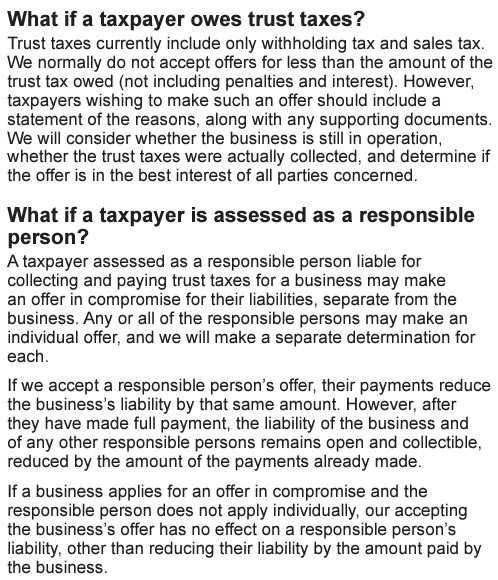Leaderboard
Popular Content
Showing content with the highest reputation on 09/27/2022 in all areas
-
@Terry D EA You are trying to change the circumstances to enable the client to continue behaviors that they should not be continuing. It is the behavior of the client that needs to change, and their unwillingness to do so results in penalties and interest. It is the behavior that is causing the issue, not the circumstances. Good choice to leave it alone. It would have made a more complicated situation that you would be blamed for when their behavior continued to cause penalties and interest. Some clients are just the way they are and our best efforts to help save them from themselves are futile. Tom Longview, TX4 points
-
Here's the link to the article in the Journal of Accountancy on Sept 23, 2022. The 7th paragraph is quite clear. (I counted singe sentences standing alone as a paragraph). The source is certainly reliable, although nobody else I've read has mentioned this - most just imply that the return MUST be filed by Sept 30, 2022. I'd like to hear your thoughts, or any one else's, on whether there is any other way to interpret this. If reliable, it will significantly alter my work schedule this week (for the better). https://www.journalofaccountancy.com/news/2022/sep/penalty-relief-deadline-fast-approaches-2019-2020-tax-returns.html Here's the operative paragraph: "Although the time for the full penalty relief is running out for businesses and individuals that have not yet filed their 2019 or 2020 returns, those that miss the deadline but file during the first few months after the Sept. 30 cutoff will still qualify for partial penalty relief. For eligible returns filed after the cutoff date, penalties will start accruing on Oct. 1 instead of the return's original due date. The IRS noted in the news release that the late-filing penalty accrues based on each month or part of a month that a return is late, so filing sooner will limit any charges that apply."4 points
-
I completely agree. I apologize for leaving it out, but honestly, didn't even know what power of appointment was till it the lawyer explained it to me. I too found this confusing and contradictory. I asked the lawyer about this and he said, during her lifetime, the 7% clause was in effect, however the power of appointment language in the trust says that upon her death, she can will the properties to whomever she wanted. This language effectively transfers the ownership of the properties (for estate purposes) to her. Meaning it's includable in her estate and qualifies for stepped up basis because she is legal owner, not the husband's trust. It's an interesting situation that I learned a great deal from. Again, thank you everyone for your comments. I hope this thread helps others in the future.3 points
-
1 point
-
The relief will apply to Forms in the 1040, 1120 and 1099 series. "The relief applies to the failure to file penalty. The penalty is typically assessed at a rate of 5% per month and up to 25% of the unpaid tax when a federal income tax return is filed late. This relief applies to forms in both the Form 1040 and 1120 series, as well as others listed in Notice 2022-36, posted today on IRS.gov. To qualify for this relief, any eligible income tax return must be filed on or before Sept. 30, 2022." "Relief is automatic; most of $1.2 billion in refunds delivered to eligible taxpayers by next month Penalty relief is automatic. This means that eligible taxpayers need not apply for it. If already assessed, penalties will be abated. If already paid, the taxpayer will receive a credit or refund. As a result, nearly 1.6 million taxpayers who already paid the penalty are receiving refunds totaling more than $1.2 billion. Most eligible taxpayers will receive their refunds by the end of September." https://www.irs.gov/pub/irs-drop/n-22-36.pdf I must say that this is unexpected!1 point
-
Thanks for the Tax Advisor Article. After much research, I don't really see an advantage to changing the tax year. If anything at all is the S-Corp making a tax payment that would as you say, defer the taxes for the client. That in and of itself, may eliminate late payment penalties but wouldn't help on the S-Corp end of getting the financials done in a timely manner. I guess it is best to wait and see what affect their proposed changes will have. Thanks to all who responded.1 point
-
1 point
-
The trust doc provided more info than the original post--lesson learned that we must see it! Still confusing though. If the wife had power of appointment, she could do whatever she wanted with the assets, yet the trust doc said she could only withdraw up to 7% principal each year. Rather than drown in the legal terms, just include it in her estate since she won't being paying estate tax anyway.1 point
-
I read an article today that said IRS has no intention of extending penalty relief for 2019 and 2020 beyond Sept 30, 2022. (They had been asked to do so due to the short time frame from the announcement to the specified date. However, the article also stated that FTF penalties for these years will begin to run on Oct 1, 2022. The penalty clock is basically resetting as of that date for those two years So it isn't a matter of falling off a cliff if the client misses the Sept 30 deadline - they would simply incur a one-month penalty for each month they are late (up to the max 5 months).1 point
-
Exactly, I have a client who spent a lot of money on an Estate Plan, a Family LLC and a Trust with multiple page instruction letter from the Attorney that he didn't understand. Since the Attorney made him uncomfortable he wouldn't ask questions. So he tends to regard all these documents as just paperwork, which leaves me in the position of refereeing and trying to keep him between the lines. Really don't enjoy being in this position, since estates and trusts are not my area of expertise!1 point
-
My "upper corner of CT" guy might know someone. He's on vacation in the Rockies right now, so not always in communication. I'll reach out to him, just in case...1 point
-
And this underscores how important it is to read the actual trust documents, because what we are told is often only loosely related to the truth. (With new clients, this also makes them scramble to *find* the trust docs, which have usually been semi-lost for years.)1 point
-
Years ago I had a S Corp with a September 30th year end, which requires you to make a tax payment so that your client can't use the year end change to defer payment of their taxes. The Tax Advisor has a very good explanation: https://www.thetaxadviser.com/issues/2009/apr/scorporationtaxyearrules.html1 point
-
>>>>>>Tell them that they either need to pay you to keep the books up to date, or hire a third-party bookkeeper that you can train and work with. <<<<<< I agree totally and have already been down this road. They are using QB Enterprise, which I would like to see them get rid of but, that's not happening. I'm taking the "I told you so" attitude. Just trying to see if there is any way to help them that is not a crutch.1 point
-
None of this goes in the wife's estate because she did not own the assets, the trust did. This is an irrevocable trust that gives her the right to income (I think, not clear from the info given) and a limited amount of principal. Upon her death, the assets owned by the trust go the beneficiaries and the trust dissolves. The 1041 will have three beneficiaries--the wife's share of income received before death and the two children's share of income each received after her death. If the assets have been distributed, you can put the property distributions on the 1041 at the trust's basis to zero it out. No income there--the 1041 is an INCOME tax return. Are you actually filing a 706? The wife would have to have $12 million in assets to necessitate one.1 point
-
Need some clarification about exactly what the trust document says concerning the wife and when the assets of the trust are to be distributed. Does it say that the children only become beneficiaries if the wife should predecease the grantor? Does it say that the assets should belong to the wife and should be distributed as part of the settling of deceased husband's estate? Does it say that the rental is held in trust for the wife's benefit during her lifetime with her receiving benefit of the income or corpus, and then it passes to the children at her death? Something else?1 point








